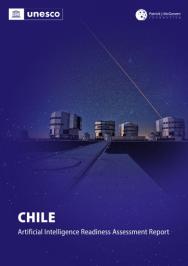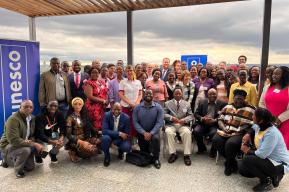News
Launch of the UNESCO AI Readiness Assessment Report for Chile

UNESCO has launched the Chile Artificial Intelligence Readiness Assessment Report. The publication of this report marks the first stage of a major initiative, in partnership with the Patrick J. McGovern Foundation, to comprehensively analyse and improve AI readiness in four countries in Latin America and Africa (Chile, Brazil, Senegal and Morocco), as part of a broader tranche of ongoing work with more than fifty countries around the world.
UNESCO has worked with the Government of Chile and Foresight Consultancy for the last year to develop a comprehensive view of Chile’s AI readiness, and to provide recommendations for the update of Chile’s National AI Policy and the development of governance frameworks and institutions.
The project involved the completion of the Readiness Assessment Methodology, a wide-ranging diagnostic tool designed by UNESCO to help countries understand how prepared they are to implement AI ethically and responsibly for all their citizens.
The results of the Assessment were supplemented by a multistakeholder consultation with more than 300 AI experts, representatives from civil society, and members of the general public from across Chile, to understand their priorities and concerns about AI.
This report presents a fundamentally optimistic vision that we at UNESCO share: that ethical governance and responsible regulation of AI is entirely consistent with innovation and economic growth, and is essential for ensuring a technological ecosystem that benefits the public good
Investment in AI in Chile is skyrocketing. Estimated venture capital (VC) investments in AI start-ups grew from US$4m in 2018 to $91m by 2020, and overall VC investments similarly increased more than tenfold between 2018 and 2023.
The Chile AI Readiness Assessment Report highlights areas of national strength in facilitating this emerging ecosystem, including digital infrastructure.
Chile ranks among the highest global standards for internet network speed, and is in the top 10 countries in terms of mobile data consumption rates.
But there remains a strong rural-urban digital divide. While the percentage of households in urban areas with internet access was 90% in 2017, compared with 77% in rural areas, there is a more significant gap in access to high-speed fixed networks, which accounted for 70% in urban areas and 10% in rural areas in 2022.
The report also notes improvements in human capital, with Chile’s talent concentration in AI growing every year since 2017. However, there is also a substantial gender gap in STEM. The proportion of men studying science or mathematics and aspiring to work as STEM professionals at age 30 is 38% compared with 23% of women, and this is also reflected in talent concentration in AI, which is more than double for men compared with women.
Public spending on research and development remains comparatively low, at 0.34% of GDP in 2020 and Chile ranks only fifth in cybersecurity in the region. But Chile scores relatively highly in online services provided by government (36th among 193 countries), open data (scoring 52.9 in the Global Data Barometer 2022), public engagement with technology (43rd among 193 countries) and trust in government websites and apps (40th among 100 countries).
The report presents policy recommendations that take into account these strengths, weaknesses, and initiatives already put in place by the Government of Chile, to address governance gaps and ensure a responsible AI ecosystem aligned with the UNESCO Recommendation on the Ethics of AI.
In particular, UNESCO recommends the development of regulatory sandboxes and the strengthening of data protection and cybersecurity laws to meet the challenges of new, more powerful AI models.
There are also highly innovative recommendations such as formulating AI strategies at the municipal level to suit local priorities, and convening a working group to assess the impact of AI on culture. These are areas in which Chile stands poised to lead the implementation of AI governance not only in the region but across the world.
In the area of capacity building, the focus is on developing human capital in the domain of AI – including promoting diversity, inclusion and gender equality in STEM, attracting investment in AI technological infrastructure, ensuring positive environmental impacts, and assessing and mitigating the impact of AI on the workforce via job retraining schemes.
This is not the time for pauses, but for action. AI is one of the most powerful tools countries have, and based on UNESCO’s recommendations, Chile’s digital ecosystem can thrive.
More information










